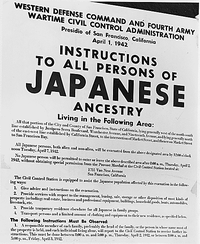Lately I’ve been having a reoccurring dream—a real nightmare. In my dream Japanese Americans are sent back to Camp. It begins with me dropping by my grandma’s to see if there are any leftovers for dinner. But something is terribly wrong.
Grandma is frantically burying the rice cooker and mumbles something about not getting caught with subversive contraband. When I ask her where Uncle Bill is, she tells me he’s packing for the Trip. When I press her for details she whispers about the Japanese American Underground Railroad. Gardena to Wisconsin via buses once used for Vegas turnarounds (now disguised as Barbara Mandrell’s tour bus) taking JAs to America’s Dairy State. She said nobody would expect us to hide there because of the whole lactose intolerant thing.
As she transfers our Japanese rice into empty boxes of Uncle Ben’s to avoid detection, she says I better hide my Earth Wind & Fire records because she heard that the neighbor’s boy was picked up at their concert. When I ask what the hell is going on she gives me a wink and pulls up her apron to show me the pinnacle of Nisei crafts—two stilettos perfectly carved out of kamaboko wood. Handing me one she says: “One time they sent us to Camp, shoganai. But not a second time. No way. Protect yourself—by any means necessary.”
Grandma gives me a hug then begins washing out plastic tofu containers, soon to be used as lightweight chawans for bands of rebel Sansei guerrillas who’ve retreated into the local Santa Monica mountains to harvest shiitake mushrooms and moyashi for community consumption.
Later in the dream I see a L.A. Times headline reading: “PRES. WILSON’S BUDGET REFORM SENDS JAS BACK TO CAMP.” The article goes on to say how Japanese Americans are the cause of a shrinking economy and were sucking up precious public monies for hospitals, schools, and other social services. It said millions would be saved with our removal.
By skirting issues of race, class, and even basic human rights, their arguments made great PR for the multinational corporations who were rollerblading for Third World sweatshops and the non-union Southwest with a fistful of tax breaks and corporate subsidies. Us JAs were already hip to words like “evacuation” and “relocation,” so the government with help from Madison Avenue—or was it Wall Street?—called the new internment camps, “Community Restructuring.”
I guess after blaming “illegal” immigrants, then permanent residents for America’s woes, it was only a matter of time before they’d come after us 2nd, 3rd, and 4th generation Americans of Color. With the way things were going, Jews knew they were next. Oye Vey!
The sick thing was that with affordable housing treated as commodity rather than a basic right in our society, poor folks of all colors were scrambling to get camp barracks for their own families. But the authorities stepped in and said they’d have to wait their turn, which they estimated would probably be sometime during the next election year.
But just like during the camps in WWII, there were acts of resistance large and small taking place. Word was out that the 442/100 Combat Battalion changed it’s motto from “Go for Broke” to “Go to Hell!” And there were reports that groups of SJs in a flurry of new found political consciousness were making Kamikaze runs in Acura Integras filled with their grandfather’s gardening tools as shrapnel.
The most promising were those folks in the community who began to understand there was no such thing as being “nonpolitical.” Everything, both action and inaction has consequences. So many worked through churches, basketball leagues, tanomoshis, J-Schools, and community centers to organize and protest the new Executive Order 9066—grotesquely called the Japanese American Civil Rights Initiative. They demanded to know why California, the wealthiest state in the nation, was balancing its budget on poor and working class peoples.
Others took to the streets along with Chicano, African American, and other brothers and sisters, chanting “PROGRESSIVE TAX RESTRUCTURING, NOT COMMUNITY RESTRUCTURING!!!” and “DOWNSIZING = UNEMPLOYMENT: STOP THE MERGERS AND MONOPOLIES!!!” Those more self-conscious followed behind with signs and banners reading DITTO! And that was OK because big and small, everybody had a role to play. Everybody could make a difference.
The most poignant was a sign held by a spry 115-year-old Issei that read: “HELL NO I WON’T GO—CAPITALISM THE REAL INU. GAMABATTE BUDDHAHEADS!”
In 1942 everybody who was 1/16 or more Japanese was sent to camp. Some escaped if they could pass for White, especially if they didn’t have a nice piece of property somebody wanted. Being Hapa doesn’t help me in my dream either. I suddenly find myself under the hot lights of an interrogation room.
Wanting to see where my cultural allegiances lie, I’m forced to take some kind of Official U.S. Hashi Test. Then I’m hooked up with tiny electrodes and made to watch widescreen Toshio Mifune and Bruce Lee movies to see how my brainwaves react. My readings were inconclusive until they played the 1973 album, Grain of Sand with Nobuko Miyamoto, Chris Ijiima, and Charlie Chin. When I heard the lyrics, “We are the children of the Chinese waiter, Born and raised in the laundry room. We are the offspring of the Japanese gardener. Who leave their stamp on Amerika...” the part of my brain that controls ethnic pride and cultural identity burned up their machine. They should of known they were messing with a “yellow pearl.”
Frustrated, they made a few phone calls then brought in some Feds in suits who I heard were trained in JA culture. White boys with Asian fetishes who couldn’t get overseas assignments and hated working with us Meiji era peasants. Word on the street was that they were mean and bitter.
FBI: For the record state your full name.
TONY: Tony David Osumi.
FBI: Mr. Osumi, would you like something to drink?
TONY: Oh no, thank you.
FBI: Mr. Osumi how fluent is your father’s Japanese?
TONY: Dad, know Japanese? Man, he’s a Sansei from W.L.A., you know near Uni Hi. He doesn’t know any Japanese.
FBI: But is not true that on 943 separate occasions he told you to “use your atama?”
TONY: Hey! How’d you know that?
FBI: Mr. Osumi are you or have you ever been a member of the CBO, CYC, NAU, or OCSA party?
TONY: I reserve my right to take the 5th.
FBI: Are you sure you wouldn’t like something to drink—soda pop?
TONY: Oh no thank you, I’m fine.
FBI: Mr. Osumi, what is stinkier, natto or takuan?
TONY: Hey that’s a trick question. Where’s my lawyer?
FBI: Mr. Osumi, do you know what maki is?
TONY: Maki? Umm. No, I don’t think so. Oh yeah, knew a girl named Maki. Lived across the street. Had a brother named Aki. Aki and Maki. Had a Sony Beta machine before anybody else on the block.
FBI: Then do you know what inari is?
TONY: Inari, Maki. Inari, Maki. Hey, are you taking about sushi? You mean footballs and white wall tires. Sure why didn’t you say so.
FBI: What is that—footballs and white wall tires—some kind of secret code? Tell us what you know, or else!.
TONY: Man, you guys are crazy. Don’t you have some people to oppress or some leaders to knock off. I know about your COINTELPRO.
FBI: All right you little half breed, have it your way. Boys, it’s Fuhrman Time!
Suddenly I’m being beaten with fists and nightsticks. I hear voices calling me a Jap, Nip, Gook, Jewboy, and Beaner looking Nigger lover. Between blows I hears screams commanding me to drink soda pop and and eat sembei.
I wake up in a cold sweat yelling “ENYRO POWER, ENYRO POWER!”
*Originally published in The Rafu Shimpo on September 22, 1995.
© 1995 Tony Osumi





